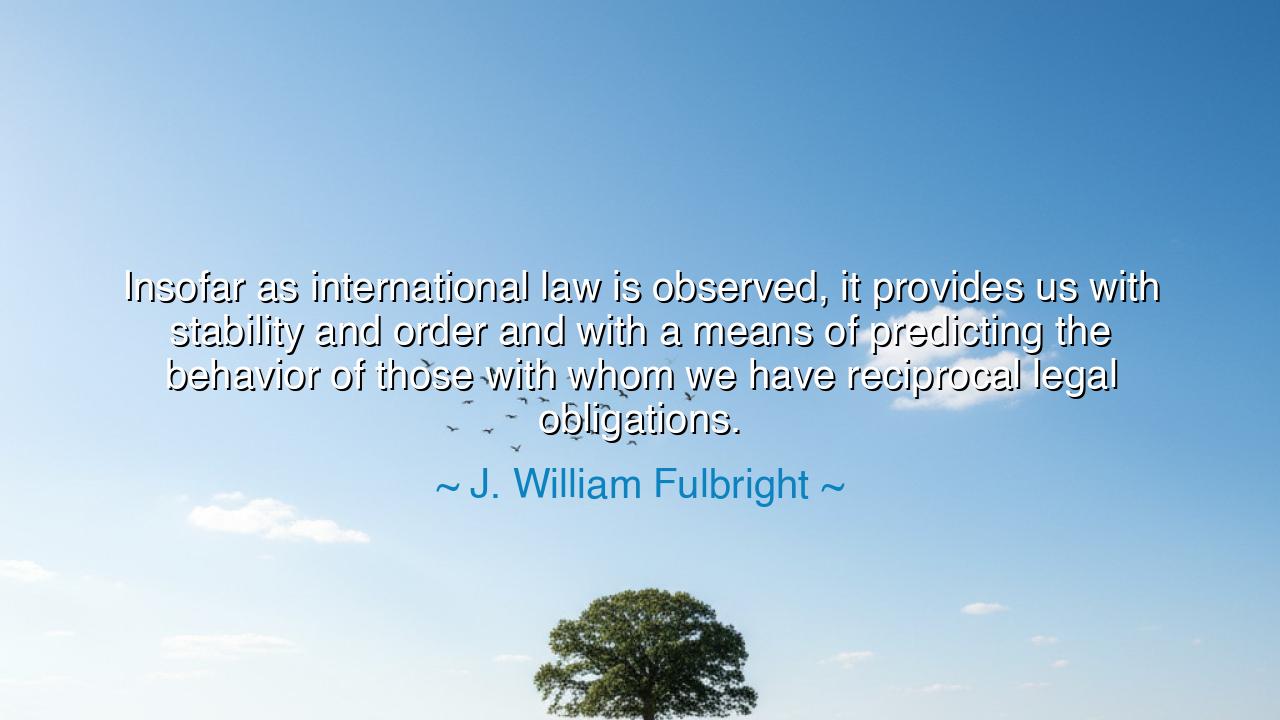
Insofar as international law is observed, it provides us with
Insofar as international law is observed, it provides us with stability and order and with a means of predicting the behavior of those with whom we have reciprocal legal obligations.






Hear the solemn words of J. William Fulbright, who spoke with wisdom drawn from the storms of the twentieth century: “Insofar as international law is observed, it provides us with stability and order and with a means of predicting the behavior of those with whom we have reciprocal legal obligations.” This is not the language of abstraction, but the voice of one who saw the chaos of war and the fragile hope of peace. He tells us that in a world of nations, as in a village of men, there must be laws, and more importantly, there must be respect for them. Without such bonds, the world dissolves into suspicion, fear, and endless strife.
The heart of his teaching rests upon international law. Unlike the law of cities, which is enforced by a sovereign, international law relies upon the will of nations to honor their word. It is fragile, yes, but when observed, it becomes a shield against chaos. It gives stability and order, allowing peoples to trade, to travel, to cooperate, without living in constant fear of betrayal. Where such law is upheld, nations may predict one another’s actions, for promises and treaties become the measure of trust. Where it is ignored, the world becomes a wilderness of suspicion, where each expects treachery, and peace is but a fleeting illusion.
History offers us examples both shining and tragic. After the carnage of the Second World War, the nations of the earth sought to bind themselves with new institutions: the United Nations, the Geneva Conventions, and countless treaties of cooperation. These were not perfect, but they represented the hope that law could tame the fury of power. Yet before this, in the years leading to that great war, we saw the collapse of law among nations: treaties ignored, borders violated, promises cast aside in pursuit of conquest. The League of Nations, born after the First World War, withered because nations failed to uphold their obligations. The result was devastation beyond imagination. Fulbright’s words are carved from such lessons: that law among nations is not a luxury but the very foundation of survival.
Consider the example of the Cuban Missile Crisis of 1962. The world stood on the brink of nuclear destruction, yet diplomacy and the recognition of reciprocal obligations pulled humanity back from the abyss. Though each side distrusted the other, the framework of international law—agreements on sovereignty, diplomacy, and negotiation—offered a channel for resolution. Order was preserved not by chance, but by adherence, however strained, to the recognition that nations are bound by rules beyond the desires of their leaders. Without such rules, war would have been the certain outcome.
The wisdom of Fulbright also speaks to the nature of trust. Nations, like men, cannot live together without some means of predicting behavior. If every agreement is uncertain, if every promise may be broken, then fear reigns supreme. But when agreements are honored, the shadow of fear recedes, and cooperation becomes possible. International law is not merely about statutes—it is about creating the soil in which trust may grow, so that commerce, culture, and peace may flourish across borders.
The lesson for us, then, is profound. Whether as citizens or leaders, we must honor our obligations, both great and small. Just as nations are bound by treaties, so too are communities bound by promises, families by trust, and individuals by their word. To break such bonds for short-term gain is to invite long-term ruin. To uphold them, even when inconvenient, is to lay the foundation for stability. Law, observed with sincerity, is not a chain but a safeguard—it preserves freedom by curbing chaos.
Therefore, children of tomorrow, take Fulbright’s teaching as a guiding star: let your word be true, let your agreements be honored, and let justice be the rule of your dealings. For in the observance of law, there is not weakness but strength; not burden but order; not oppression but the promise of peace. And as nations are but assemblies of men, so too the discipline of law begins in the heart of each individual. Honor law, build trust, and you will create a world where stability endures and peace has a chance to flourish.






AAdministratorAdministrator
Welcome, honored guests. Please leave a comment, we will respond soon